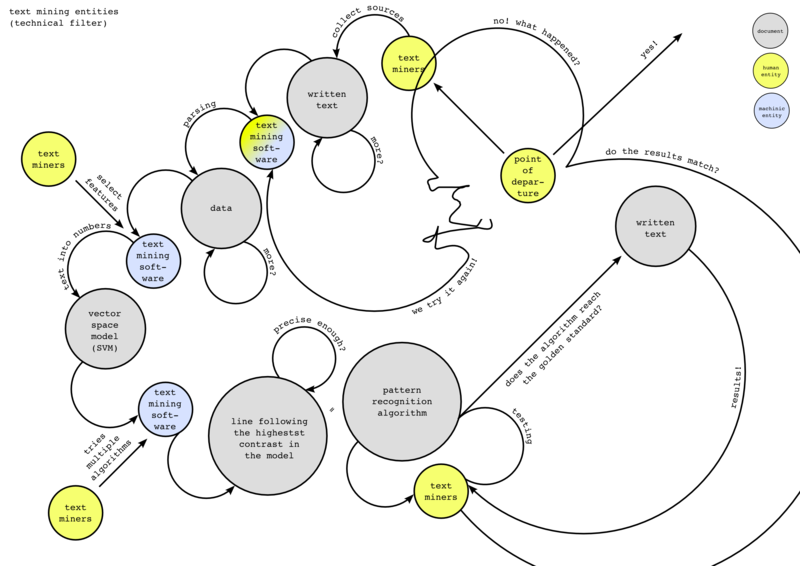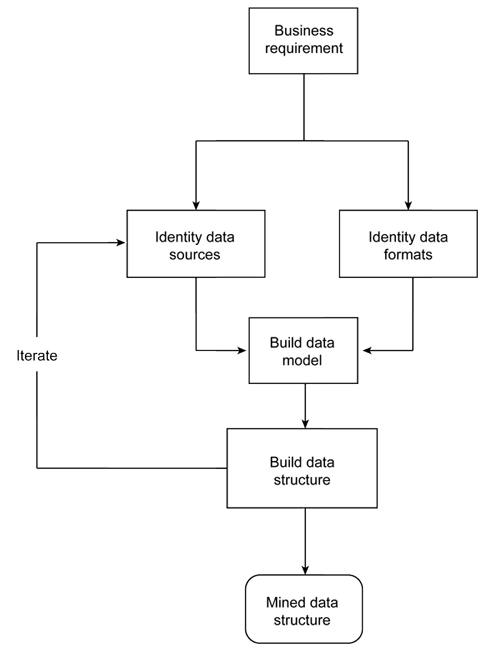User:Manetta/i-could-have-written-that/knowledge-discovery-workflow: Difference between revisions
mNo edit summary |
No edit summary |
||
| Line 1: | Line 1: | ||
<div style="width:100%;max-width:800px;"> | <div style="width:100%;max-width:800px;"> | ||
__NOTOC__ | __NOTOC__ | ||
=''knowledge discovery'' workflow= | =''knowledge discovery'' workflow = | ||
intro? | |||
=circularity= | |||
circularity that is present in the construction of significance | |||
-------------------------- | |||
''the assumptions that you want to '''confirm''''' (Fuller, 2012 - 100) | |||
---------------------------- | |||
''The key to success is that the information extracted must be '''comprehensible''' in that it helps to explain the data.'' (Witter 2011, p.387) | |||
---------------------------- | |||
''The process of data analysis, discovery, and model-building is often '''iterative''' as you target and identify the different information that you can extract. You must also understand how to relate, map, associate, and cluster it with other data to produce the result. Identifying the source data and formats, and then mapping that information to our given result '''can change after you discover different elements and aspects of the data'''.'' [http://www.ibm.com/developerworks/library/ba-data-mining-techniques/ (IBM developerWorks page on Data mining techniques)] | |||
------------------------ | |||
[[File:Text-mining-technical-process.png|800px|border]] | [[File:Text-mining-technical-process.png|800px|border]] | ||
| Line 10: | Line 30: | ||
<small>workflow from [http://www.ibm.com/developerworks/library/ba-data-mining-techniques/ IBM developerWorks page on Data mining techniques]</small> | <small>workflow from [http://www.ibm.com/developerworks/library/ba-data-mining-techniques/ IBM developerWorks page on Data mining techniques]</small> | ||
Revision as of 15:38, 18 January 2016
knowledge discovery workflow
intro?
circularity
circularity that is present in the construction of significance
the assumptions that you want to confirm (Fuller, 2012 - 100)
The key to success is that the information extracted must be comprehensible in that it helps to explain the data. (Witter 2011, p.387)
The process of data analysis, discovery, and model-building is often iterative as you target and identify the different information that you can extract. You must also understand how to relate, map, associate, and cluster it with other data to produce the result. Identifying the source data and formats, and then mapping that information to our given result can change after you discover different elements and aspects of the data. (IBM developerWorks page on Data mining techniques)
 workflow based on Pattern, a text-mining software package developed at the University of Antwerp
workflow based on Pattern, a text-mining software package developed at the University of Antwerp

workflow from IBM developerWorks page on Data mining techniques
notes
no ne
